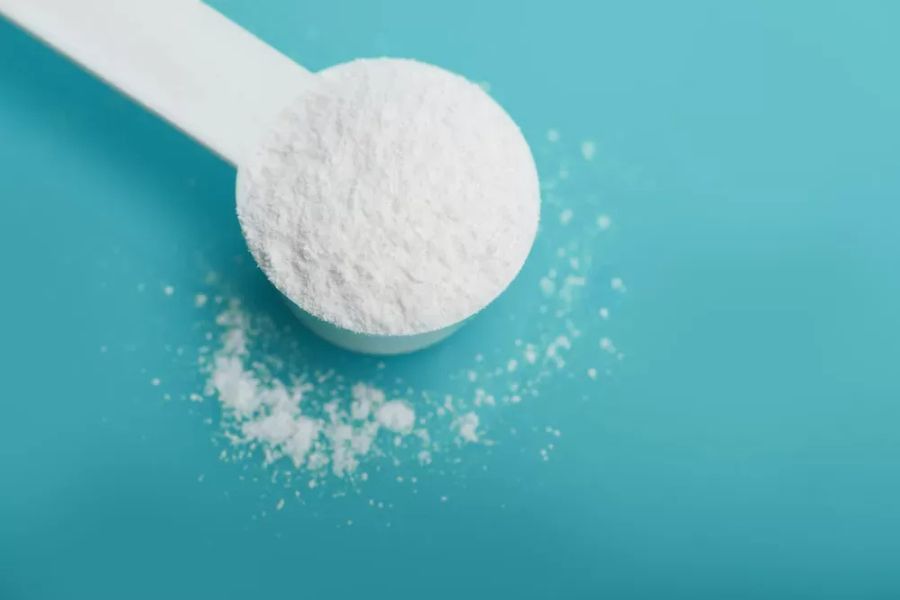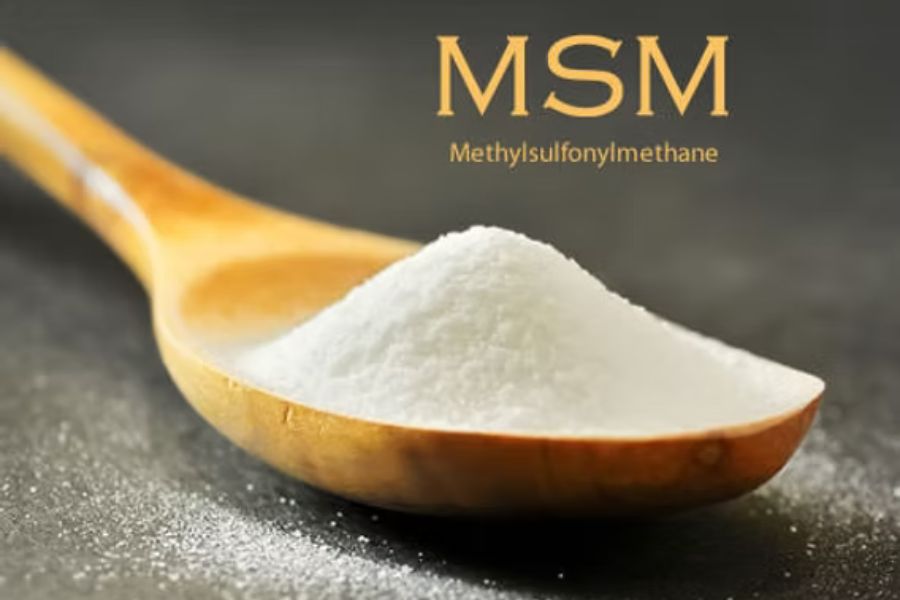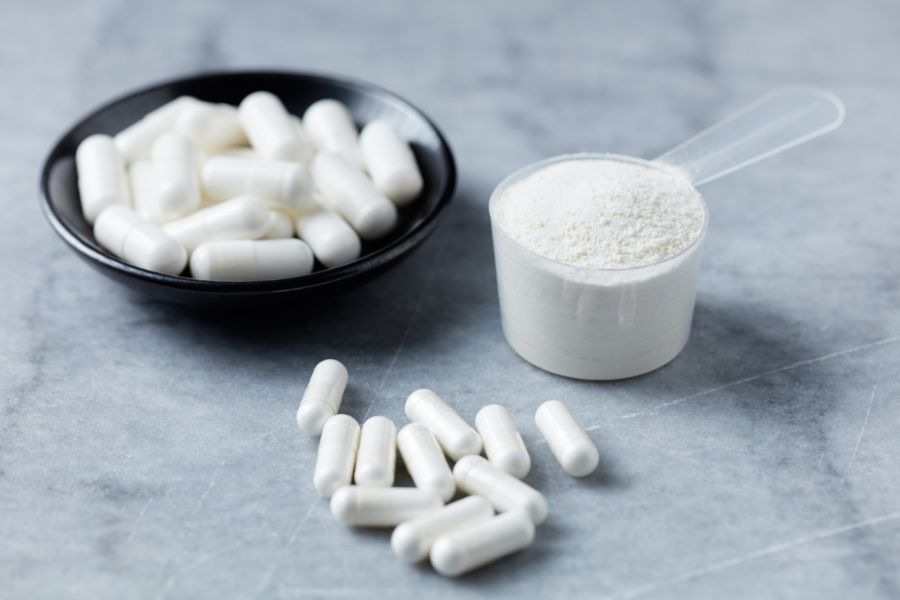Methylsulfonylmethane, commonly known as MSM, is a sulfur-containing compound found naturally in plants, animals, and humans. It’s widely sold as a dietary supplement, often promoted for its potential to relieve joint pain, reduce inflammation, and support healthy skin and hair. While many users report benefits, the compound isn’t without its risks.
Like most supplements, MSM may cause side effects or interact with other substances in the body. Its safety profile is still under research, especially for long-term use. Understanding these potential drawbacks is important for anyone considering adding MSM to their routine.
This article reviews the possible negatives of MSM. It covers common side effects, drug interactions, risks for certain populations, and other concerns that users should keep in mind before starting supplementation.
What Is MSM?
Methylsulfonylmethane (MSM) is an organic sulfur compound made up of sulfur, oxygen, and methyl groups. While sulfur is naturally present in many foods, MSM supplements offer a concentrated form that’s often marketed for pain relief, inflammation reduction, and skin health.
MSM occurs naturally in small amounts in foods like fruits, vegetables, grains, and milk. However, the MSM found in supplements is usually produced through a chemical process to ensure consistency and purity. It’s most commonly available in capsules, powders, and topical creams.
The supplement is frequently used by individuals managing conditions like osteoarthritis, muscle soreness, or seasonal allergies. Some people also take MSM to improve the appearance of hair, skin, and nails. Despite its popularity, many of these claims are based on limited or early-stage studies, making it important to examine both the potential benefits and drawbacks.
Common Side Effects of MSM
While many people tolerate MSM well, some experience side effects — especially during the early stages of use or when taking higher doses. These reactions vary in severity and may resolve as the body adjusts, but they can be uncomfortable or concerning for new users.
Digestive Issues
The most commonly reported side effects involve the digestive system. Some users experience bloating, gas, nausea, or diarrhea shortly after starting MSM. These effects are often dose-dependent and may improve when the dosage is reduced.
Headaches and Dizziness
Headaches are another frequently reported issue. In some cases, MSM may also cause lightheadedness or dizziness. These symptoms could result from how the compound interacts with blood vessels or alters hydration levels in the body.
Fatigue or Insomnia
MSM may affect energy levels differently depending on the person. Some users report increased fatigue or, conversely, trouble sleeping. This can happen when MSM is taken too late in the day or in amounts that disrupt normal sleep cycles.
Skin Reactions
Itching, rashes, or flushing may occur, particularly in individuals with sensitive skin. These reactions are often mild but can be alarming if unexpected. Discontinuing the supplement typically resolves the issue.
While most of these side effects are not considered dangerous, they can signal that the body is not responding well to MSM. Anyone experiencing persistent or severe symptoms should stop use and consult a healthcare provider.

Allergic Reactions and Hypersensitivity
Although true allergic reactions to MSM appear to be rare, they can occur. Some individuals may experience symptoms that suggest an immune response, which can range from mild irritation to more serious reactions.
Signs of a Possible Allergic Reaction
Common signs include:
- Itching or hives
- Swelling of the lips, tongue, or face
- Difficulty breathing or shortness of breath
- Throat tightness
These symptoms may indicate a serious allergic response and require immediate medical attention. Individuals with a history of allergic reactions to other supplements or sulfur-based compounds should exercise caution when trying MSM for the first time.
Clarifying Sulfur vs. Sulfa Sensitivities
MSM contains sulfur, which is a natural element found in many foods and compounds. However, some people confuse sulfur with sulfa drugs, a group of antibiotics that can trigger allergic reactions in certain individuals. MSM does not contain sulfonamides, the reactive component in sulfa drugs, but people with a sulfa allergy should still speak with a healthcare provider before taking MSM.
Being alert to early warning signs of hypersensitivity can help users avoid more severe issues. Those with known sensitivities or immune conditions should take extra precautions when introducing any new supplement, including MSM.
Interactions with Medications or Other Supplements
MSM may interact with certain medications or supplements, especially those that affect blood clotting, inflammation, or immune response. While many of these interactions have not been extensively studied, it’s important to approach supplementation carefully if you’re taking other treatments.
Blood Thinners
MSM may have mild blood-thinning effects. When combined with prescription anticoagulants like warfarin or over-the-counter agents like aspirin, it may increase the risk of bruising or bleeding. This is especially important for individuals scheduled for surgery or those with bleeding disorders.
Anti-Inflammatory Medications
Many people use MSM for its anti-inflammatory properties. Taking it alongside NSAIDs (non-steroidal anti-inflammatory drugs) such as ibuprofen or naproxen could amplify their effects. While this might sound beneficial, it may also increase the risk of gastrointestinal irritation or other side effects tied to inflammation suppression.
Other Supplements
Combining MSM with other supplements that support joint health—such as glucosamine, chondroitin, turmeric, or omega-3s—might lead to overlapping effects. While some people use these combinations safely, they may also experience compounded side effects like digestive upset or headaches.
Before adding MSM to a supplement routine, it’s best to review all current medications and supplements with a healthcare provider. This step helps prevent interactions and ensures the overall plan is both effective and safe.
Lack of Long-Term Safety Data
MSM has been studied in short-term trials, many of which report a favorable safety profile for doses up to 3 grams per day over a few weeks or months. However, there is limited research on the long-term effects of consistent MSM use, especially over several years.
Short-Term Use vs. Long-Term Risk
Most available studies focus on short-term supplementation—typically lasting 4 to 12 weeks. These trials often show minimal side effects, but their limited scope means we don’t fully understand what might happen with continuous use over time. Without long-term studies, it’s difficult to assess the risk of chronic side effects, nutrient imbalances, or cumulative toxicity.
Need for Ongoing Monitoring
Because MSM influences inflammation, immune response, and sulfur levels in the body, ongoing use may impact these systems in ways that are not yet fully understood. Some researchers have raised questions about how prolonged sulfur supplementation could affect liver or kidney function, especially in people with pre-existing conditions.
Until more long-term safety data becomes available, it’s important to use MSM with caution. People taking it for extended periods should monitor for side effects, maintain regular checkups, and avoid increasing the dose without medical supervision.
Potential Risks for Specific Populations
While MSM may be safe for many healthy adults in the short term, certain groups face a higher risk of side effects or complications. These individuals should use added caution—or avoid MSM entirely—unless directed otherwise by a qualified healthcare provider.
Pregnant and Breastfeeding Women
There’s a lack of safety data on MSM use during pregnancy and lactation. Because no well-controlled studies have confirmed its safety for developing fetuses or nursing infants, most healthcare professionals advise against taking MSM while pregnant or breastfeeding.
Children
Research on MSM’s effects in children is extremely limited. There is no established safe dosage for minors, and their developing systems may respond differently to sulfur compounds. Without pediatric-specific studies, children should not take MSM unless recommended by a pediatrician.
People with Chronic Health Conditions
Individuals with liver or kidney disease may need to avoid MSM. Since these organs are responsible for metabolizing and clearing compounds from the body, impaired function could increase the risk of toxicity or adverse effects. Those with autoimmune diseases should also consult a doctor before using MSM, as it may influence immune activity.
Surgical Patients
Because MSM may have mild blood-thinning properties, patients scheduled for surgery are typically advised to stop taking it at least one to two weeks beforehand. This precaution helps minimize the risk of excessive bleeding during and after the procedure.
Being part of one of these higher-risk groups doesn’t always mean MSM must be avoided entirely, but it does mean that professional guidance is essential before starting supplementation.

Contamination or Quality Control Concerns
Like many dietary supplements, MSM products are not tightly regulated in the United States. This lack of oversight can lead to inconsistencies in quality, purity, and safety between brands. Consumers may unknowingly purchase MSM supplements that contain contaminants or fall short of their labeled potency.
Risk of Contaminants
Some MSM supplements may contain traces of heavy metals, residual solvents from manufacturing, or other unwanted byproducts. These contaminants are especially concerning in products sourced from facilities that do not follow good manufacturing practices (GMP). Long-term exposure to even low levels of contaminants can pose health risks.
Labeling Accuracy and Dosage Variability
Studies of dietary supplements have shown that some products do not contain the amounts of active ingredients listed on their labels. With MSM, this could mean consumers receive either too little to be effective or too much, increasing the risk of side effects. In some cases, products may also include undisclosed ingredients.
How to Reduce the Risk
To minimize these risks, consumers should choose MSM supplements from reputable companies that conduct third-party testing and are certified by recognized industry standards (such as USP, NSF, or GMP). Transparent labeling, batch testing, and published Certificates of Analysis can provide added assurance.
Even a well-studied compound like MSM carries risks when poor manufacturing or labeling practices are involved. Quality control plays a key role in ensuring safety and reliability.
Overuse or High Dosage Issues
While MSM is often marketed as safe and well-tolerated, taking too much can increase the risk of side effects. Some users assume that higher doses will produce faster or stronger results, but this approach can lead to unnecessary discomfort or complications.
Symptoms of Overconsumption
Taking MSM in excessive amounts—particularly over 3 to 4 grams per day—can lead to a range of unpleasant side effects. These may include:
- Nausea or vomiting
- Abdominal cramps
- Headaches
- Fatigue
- Skin irritation
- Diarrhea or loose stools
These reactions often occur when users exceed recommended dosages or fail to gradually build up their intake. In rare cases, very high doses may also place added stress on the liver or kidneys, especially in people with underlying conditions.
Lack of Evidence for Higher Doses
Most clinical studies use doses between 1.5 and 3 grams per day, which appear to be effective for joint pain and inflammation in many participants. There is no strong evidence that taking more than this amount leads to better outcomes. In fact, it may increase the risk of adverse effects without adding any benefit.
To avoid problems, users should start with the lowest effective dose and increase only if needed and well-tolerated. It’s also wise to take breaks or cycle usage if taking MSM for extended periods.
Misleading Marketing or Unfounded Claims
Despite MSM’s popularity, many of its advertised benefits lack strong scientific backing. Supplement companies often promote MSM as a cure-all for joint pain, skin issues, muscle soreness, and even immunity. However, these claims can be misleading, especially when not supported by large, peer-reviewed clinical trials.
Overstated Benefits
While some studies suggest MSM may help with mild joint discomfort or inflammation, results are not consistent across all populations. Advertisements that promise dramatic improvements or instant results are often exaggerated. This creates unrealistic expectations and may lead people to overlook more effective, evidence-based treatments.
Unregulated Health Claims
In the United States, the FDA does not review or approve dietary supplements for safety or effectiveness before they reach the market. As a result, MSM products may carry broad, vague, or misleading statements like “supports overall wellness” or “promotes youthful skin,” without clear scientific justification.
Self-Treatment Risks
Relying solely on MSM to manage chronic conditions such as arthritis, allergies, or autoimmune issues may delay proper diagnosis and treatment. Supplementing without medical guidance may also lead to overlooked interactions or dosing mistakes.
Consumers should remain skeptical of marketing claims that sound too good to be true. It’s important to review independent research, check for third-party testing, and speak with a healthcare provider before using MSM as a treatment for any condition.
What to Consider Before Taking MSM
Before adding MSM to your daily routine, it’s important to weigh the potential benefits against the possible risks. While many people tolerate MSM without issue, individual responses can vary, and taking it without proper guidance may lead to unwanted effects.
Speak with a Healthcare Provider
Consulting a doctor or pharmacist is especially important if you have any underlying health conditions, take prescription medications, or are pregnant or breastfeeding. A healthcare provider can help determine if MSM is appropriate and safe for your situation.
Start with a Low Dose
If you choose to try MSM, begin with the lowest recommended dose—usually 500 to 1,000 mg per day. Gradually increase only if needed and tolerated. This approach helps your body adjust and reduces the likelihood of side effects like bloating or headaches.
Watch for Side Effects
Monitor your body’s response during the first few weeks. If you experience nausea, dizziness, changes in sleep, or skin irritation, stop taking MSM and reassess. Mild symptoms may fade with time, but persistent or severe reactions warrant discontinuation.
Choose High-Quality Products
Not all supplements are created equal. Look for MSM from reputable brands that follow GMP (Good Manufacturing Practice) guidelines and offer third-party testing. Avoid products with vague ingredient lists or unsupported claims.
Avoid Risky Combinations
Do not combine MSM with other anti-inflammatories, blood thinners, or joint supplements without professional advice. Taking multiple products with overlapping effects increases the chance of side effects or complications.
Taking a thoughtful, cautious approach helps reduce the risk of problems and improves the chances of a positive experience with MSM supplementation.
Conclusion
MSM is widely used for joint support, inflammation, and skin health, but it isn’t without its drawbacks. While many people tolerate it well, others experience digestive discomfort, headaches, skin reactions, or fatigue. Certain groups—such as pregnant women, children, or people with chronic conditions—may face greater risks and should be especially cautious.
Beyond side effects, concerns also include poor supplement quality, lack of long-term safety data, and potential interactions with medications or other supplements. Misleading marketing can further complicate decision-making, pushing consumers to expect results that aren’t guaranteed or backed by science.
Before taking MSM, it’s important to do your research, start with a low dose, and consult with a healthcare provider—especially if you have existing health issues or take other medications. Choosing reputable brands and monitoring your body’s response can also help you stay safe while using MSM.
Being informed helps you make smarter choices about your health. MSM may benefit some people, but it’s not risk-free—and it’s not right for everyone.
Frequently Asked Questions (FAQs)
1. Can MSM cause liver damage?
There’s no strong evidence linking MSM to liver damage in healthy individuals at standard doses. However, long-term safety studies are limited, and those with preexisting liver conditions should consult a healthcare provider before use.
2. Is MSM safe to take daily?
Short-term studies suggest MSM is generally safe for daily use in doses up to 3 grams. However, long-term safety remains unclear, and users should monitor for side effects and avoid exceeding recommended dosages without medical guidance.
3. Does MSM interact with any medications?
MSM may interact with blood thinners, anti-inflammatory drugs, or other supplements with similar effects. Always review your full medication list with a healthcare professional before adding MSM to your routine.
4. What’s the safest way to start MSM?
Start with a low dose—typically 500 to 1,000 mg per day—and increase gradually if no side effects occur. Take it with food and drink plenty of water to reduce digestive discomfort.
5. Should I stop MSM if I experience side effects?
Yes. If you experience symptoms like headaches, skin rash, nausea, or dizziness, stop taking MSM and reassess. If symptoms persist or worsen, seek medical advice.
References
- Debbi, E. M., Agar, G., Fichman, G., Ziv, Y. B., Kardosh, R., Halperin, N., & Shiran, A. (2011). Efficacy of methylsulfonylmethane supplementation on osteoarthritis of the knee: A randomized controlled study. BMC Complementary and Alternative Medicine, 8(1), 1-8.
- Kim, L. S., Axelrod, L. J., Howard, P., Buratovich, N., & Waters, R. F. (2006). Efficacy of methylsulfonylmethane (MSM) in osteoarthritis pain of the knee: A pilot clinical trial. Osteoarthritis and Cartilage, 14(3), 286–294.
- Magnuson, B. A., Appleton, J., Gillies, L. A., Reynolds, D. S., & Semp, D. (2007). Toxicological safety assessment of methylsulfonylmethane (MSM). Food and Chemical Toxicology, 45(5), 851–864.
- Barrager, E., Veltmann, J. R., Schauss, A. G., & Schiller, R. N. (2002). A multicentered, open-label trial on the safety and efficacy of methylsulfonylmethane in the treatment of seasonal allergic rhinitis. The Journal of Alternative and Complementary Medicine, 8(2), 167–173.
- Pearl, R. A., & Harke, H. (2007). Double-blind, placebo-controlled study of MSM for treatment of interstitial cystitis. The Journal of Urology, 177(1), 63–66.
- Oliveira, C. C., Monteiro, M. C., Navegantes, A. M., Ferreira, E. O., & Sampaio, F. J. (2009). Toxicological evaluation of methylsulfonylmethane using in vitro and in vivo approaches. Food and Chemical Toxicology, 47(2), 524–530.
- Brien, S., Prescott, P., Bashir, N., Lewith, H., and Lewith, G. Systematic review of the nutritional supplements dimethyl sulfoxide (DMSO) and methylsulfonylmethane (MSM) in the treatment of osteoarthritis. Osteoarthritis.Cartilage. 2008;16:1277-1288. View abstract.
- Ameye, L. G. and Chee, W. S. Osteoarthritis and nutrition. From nutraceuticals to functional foods: a systematic review of the scientific evidence. Arthritis Res Ther 2006;8:R127. View abstract.
- Nakhostin-Roohi B, Barmaki S, Khoshkhahesh F, et al. Effect of chronic supplementation with methylsulfonylmethane on oxidative stress following acute exercise in untrained healthy men. J Pharm Pharmacol. 2011 Oct;63:1290-4. View abstract.
- Gumina S, Passaretti D, Gurzì MD, et al. Arginine L-alpha-ketoglutarate, methylsulfonylmethane, hydrolyzed type I collagen and bromelain in rotator cuff tear repair: a prospective randomized study. Curr Med Res Opin. 2012 Nov;28:1767-74. View abstract.
- Notarnicola A, Pesce V, Vicenti G, et al. SWAAT study: extracorporeal shock wave therapy and arginine supplementation and other nutraceuticals for insertional Achilles tendinopathy. Adv Ther. 2012 Sep;29:799-814. View abstract.
- Barmaki S, Bohlooli S, Khoshkhahesh F, et al. Effect of methylsulfonylmethane supplementation on exercise – Induced muscle damage and total antioxidant capacity. J Sports Med Phys Fitness. 2012 Apr;52:170-4. View abstract.
- Berardesca E, Cameli N, Cavallotti C, et al. Combined effects of silymarin and methylsulfonylmethane in the management of rosacea: clinical and instrumental evaluation. J Cosmet Dermatol. 2008 Mar;7:8-14. View abstract.
- Joksimovic N, Spasovski G, Joksimovic V, et al. Efficacy and tolerability of hyaluronic acid, tea tree oil and methyl-sulfonyl-methane in a new gel medical device for treatment of haemorrhoids in a double-blind, placebo-controlled clinical trial. Updates Surg 2012;64:195-201. View abstract.
- Gulick DT, Agarwal M, Josephs J, et al. Effects of MagPro on muscle performance. J Strength Cond Res 2012;26:2478-83. View abstract.
- Kalman DS, Feldman S, Scheinberg AR, et al. Influence of methylsulfonylmethane on markers of exercise recovery and performance in healthy men: a pilot study. J Int Soc Sports Nutr. 2012 Sep 27;9:46. View abstract.







